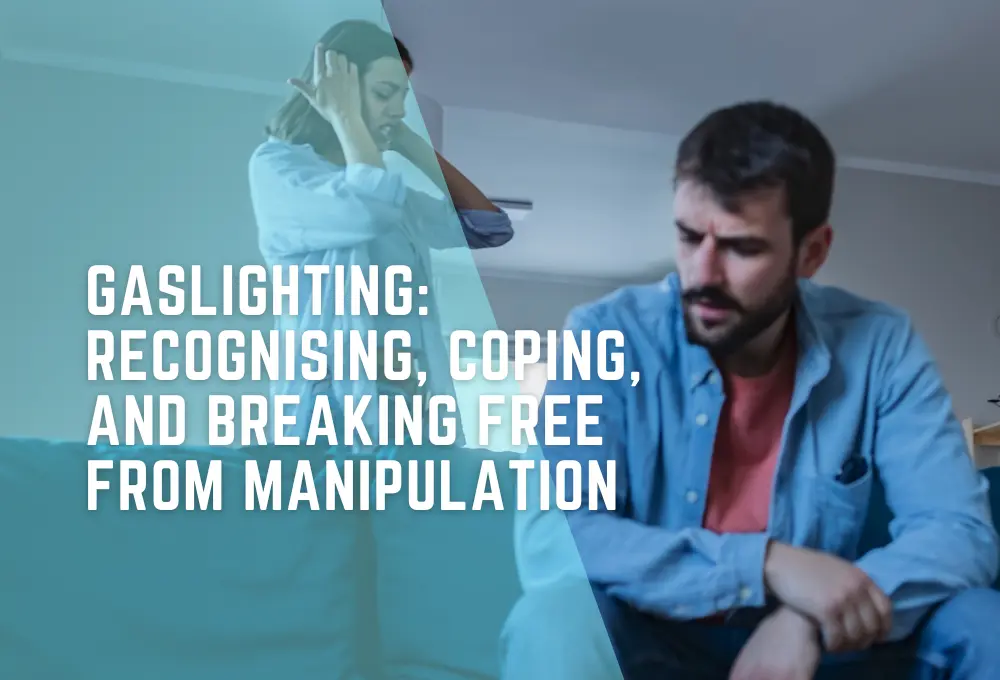
Gaslighting: Recognising, Coping, and Breaking Free from Manipulation
Gaslighting, a term derived from the 1944 movie “Gaslight,” refers to a form of psychological manipulation aimed at making a person doubt their own perceptions, memories, or reality. This insidious tactic can have a profound impact on the victim’s mental well-being and sense of self. In this blog, we will explore the concept of gaslighting, provide insights into recognising it, delve into the motives behind its use, and offer practical strategies to cope with and overcome gaslighting. Whether you’re a victim seeking understanding or a concerned friend wanting to help, this guide will equip you with the knowledge needed to identify and address gaslighting.

Recognising Gaslighting
Gaslighting is a subtle and complex form of manipulation that often goes unnoticed by its victims. By sowing seeds of doubt and confusion, gas-lighters erode their target’s confidence and ability to discern reality. Recognising gaslighting is crucial for breaking free from its grip. Here are some key signs to watch out for:
- Denying Reality: Gas-lighters often deny events or occurrences that have clearly taken place, leaving their victims questioning their own memory and perception.
- Withholding Information: Deliberately withholding information or selectively sharing details can distort the victim’s understanding of a situation, making them doubt their own grasp of reality.
- Shifting Blame: Gas-lighters skilfully deflect blame onto their victims, making them believe they are responsible for the manipulation or conflict.
- Contradictions and Confusion: Gaslighting involves creating inconsistencies and contradictions, causing the victim to feel disoriented and unsure of what’s real.
- Minimisation: Downplaying the victim’s feelings, experiences, or concerns invalidates their emotions and fosters self-doubt.
- Isolation: Gas-lighters may isolate the victim from friends and family, making them more dependent on the manipulator’s version of events.
- False Narratives: Creating alternative narratives or twisting facts can leave victims questioning their memory and perceptions.

Why People Gaslight
Understanding the motives behind gaslighting can provide insights into why individuals engage in this harmful behaviour:
- Control and Power: Gas-lighters often seek to control their victims by distorting their reality. Manipulating someone’s perception can give the gas-lighter a sense of power and dominance.
- Evasion of Responsibility: By making the victim doubt themselves, gas-lighters can avoid taking accountability for their actions or addressing the issues at hand.
- Emotional Manipulation: Gas-lighters use emotional manipulation to exploit their victim’s vulnerabilities, making them more susceptible to the gas-lighter’s influence.
- Maintaining Dominance: Gaslighting can be a tool to assert dominance in relationships, workplaces, or other social settings.
- Insecurity: Gas-lighters might feel threatened by the victim’s strengths or achievements, leading them to undermine the victim’s confidence and self-esteem.

Coping with Gaslighting
Coping with gaslighting requires self-awareness, resilience, and supportive strategies. If you suspect you’re being gaslit, consider these steps:
- Trust Your Instincts: Acknowledge your feelings and intuition. If something doesn’t feel right, it’s important to trust yourself.
- Seek External Validation: Reach out to trusted friends, family members, or professionals who can provide an objective perspective on the situation.
- Keep Records: Document incidents, conversations, and events to counter the gas-lighter’s attempts to distort reality.
- Set Boundaries: Establish clear boundaries with the gas-lighter to protect your emotional well-being.
- Educate Yourself: Learn about gaslighting and manipulation tactics to recognise them when they occur.
- Practice Self-Care: Engage in activities that nurture your mental and emotional health, such as meditation, journaling, or therapy.

Breaking Free from Gaslighting
Overcoming gaslighting requires courage and determination. Here’s how to break free from its grip:
- Detach Emotionally: Recognise that the gas-lighter’s actions are about their need for control, not a reflection of your worth.
- Rebuild Self-Esteem: Focus on your strengths, accomplishments, and positive qualities to rebuild your self-esteem.
- Stay Empowered: Surround yourself with supportive people who uplift and validate your experiences.
- Assertiveness: Practice assertive communication to express your feelings and needs confidently.
- Consider Professional Help: Therapists experienced in trauma and manipulation can provide valuable guidance and support.

Gaslighting is a manipulative tactic that can wreak havoc on a person’s mental well-being. By recognising the signs, understanding the motives, and implementing effective coping strategies, you can regain control of your reality and break free from the gas-lighter’s hold. Remember, you are not alone, and seeking support is a crucial step toward reclaiming your sense of self and living a life free from manipulation.



